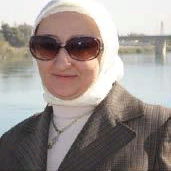
Ghada Kattmah
Work place: General Commission of Agricultural Scientific Research, Department of Horticulture science, Syria
E-mail: Ghada978@Gmail.com
Website:
Research Interests: Earth Sciences, Earth & Environmental Sciences
Biography
Ghada Kattmah, received her BSc in Agricultural science from Damascus University in 2000 and a Diploma in Horticultural science 2002. She received MSc. degrees in olive resources and genetic improvement from Damascus University, Syria, in 2009. She has worked at General Commission of Agriculture Scientific Research (GCSAR) as researcher assistant, and participated in many cooperative projects with European united, she attended many courses of international olive council on olive production. Her Current conducting research are Essentially about description, evaluation and genetic relationship of olive resources including wild types by using Contemporary techniques, in addition to some researches about pomegranate and fig cultivars. She also works as a trainer in the field of organic system production in cooperative with FAO organization.
Author Articles
Fig (Ficus Carica L.) Identification Based on Mutual Information and Neural Networks
By Ghada Kattmah Gamil Abdel-Azim
DOI: https://doi.org/10.5815/ijigsp.2013.09.08, Pub. Date: 8 Jul. 2013
The process of recognition and identification of plant species is very time-consuming as it has been mainly carried out by botanists. The focus of computerized living plant's identification is on stable feature's extraction of plants. Leaf-based features are preferred over fruits, also the long period of its existence than fruits. In this preliminary study, we study and propose neural networks and Mutual information for identification of two, three Fig cultivars (Ficus Carica L.) in Syria region. The identification depends on image features of Fig tree leaves. A feature extractor is designed based on Mutual Information computation. The Neural Networks is used with two hidden layers and one output layer with 3 nodes that correspond to varieties (classes) of FIG leaves. The proposal technique is a tester on a database of 84 images leaves with 28 images for each variety (class). The result shows that our technique is promising, where the recognition rates 100%, and 92% for the training and testing respectively for the two cultivars with 100% and 90 for the three cultivars. The preliminary results obtained indicated the technical feasibility of the proposed method, which will be applied for more than 80 varieties existent in Syria.
[...] Read more.Other Articles
Subscribe to receive issue release notifications and newsletters from MECS Press journals